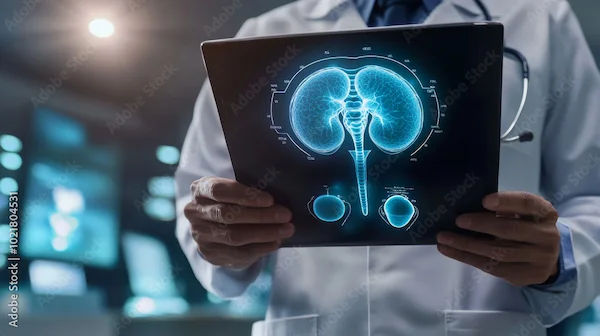Top 5 Cancers in Men: Early Signs and Symptoms
Learn about the top 5 cancers affecting men, their early signs, and symptoms to support timely detection and treatment.

Written by Dr. Rohinipriyanka Pondugula
Reviewed by Dr. Siri Nallapu MBBS
Last updated on 13th Jan, 2026

Introduction
When it comes to health, men often adopt a "wait and see" approach, sometimes dismissing early warning signs as minor inconveniences. However, when it comes to cancer, early detection is the most powerful weapon for successful treatment and improved outcomes. Understanding the signs of the most common cancers among men is not about fostering fear, but about promoting awareness and proactive health management. This guide breaks down the five most prevalent cancers affecting men, detailing the specific symptoms to watch for and emphasising the critical importance of listening to your body. Knowledge is your first line of defense; let’s empower you with it.
1. Prostate Cancer: The Silent Threat
Prostate cancer is the most common cancer diagnosed in men, particularly those over the age of 50. It develops in the prostate gland, a small walnut-shaped gland that produces seminal fluid.
What is Prostate Cancer?
This cancer occurs when cells in the prostate gland mutate and begin to multiply uncontrollably. While many prostate cancers grow slowly and remain confined to the gland, some can be aggressive and spread quickly.
Early Signs and Symptoms to Watch For
In its early stages, prostate cancer often has no symptoms. When symptoms do appear, they can mimic other conditions like Benign Prostatic Hyperplasia (BPH). Be alert to:
- Urinary Changes: A weak or interrupted urine flow, frequent urination (especially at night), difficulty starting or stopping urination, or a feeling of not emptying the bladder completely.
- Blood: Blood in the urine or semen.
- Discomfort: Pain or a burning sensation during urination or ejaculation.
- Advanced Symptoms: Persistent pain in the back, hips, or pelvis.
If you experience any persistent urinary symptoms, it's crucial to consult a doctor for a proper evaluation.
Risk Factors and Screening Guidelines
Key risk factors include age (risk increases significantly after 50), family history, and race (African-American men are at higher risk). Screening typically involves a PSA (Prostate-Specific Antigen) blood test and a digital rectal exam (DRE). The decision to screen should be a shared one between you and your doctor, based on your individual risk profile.
Get Your Health Assessed
2. Lung Cancer: Beyond the Smoker's Cough
Lung cancer is the leading cause of cancer death for men. While smoking is the primary risk factor, non-smokers can develop it too, often due to radon gas, secondhand smoke, or other environmental exposures.
Understanding Lung Cancer Types
The two main types are Non-Small Cell Lung Cancer (NSCLC) and Small Cell Lung Cancer (SCLC), which grow and spread differently and are treated in distinct ways.
Key Symptoms Men Often Ignore
A persistent cough is a classic sign, but there are others men should never ignore:
- A cough that doesn’t go away or gets worse.
- Coughing up blood or rust-coloured phlegm.
- Chest pain that is often worse with deep breathing, coughing, or laughing.
- Hoarseness, shortness of breath, and wheezing.
- Unexplained weight loss and loss of appetite.
- Recurrent infections like bronchitis or pneumonia.
Many men attribute a lingering cough to a cold or smoking, but if it lasts more than a few weeks, it warrants medical attention.
Consult a Medical Oncologist for the best advice
3. Colorectal Cancer: A Preventable Adversary
Colorectal cancer, which starts in the colon or rectum, is the third most common cancer in men. It often begins as a small, noncancerous clump of cells called a polyp, which over time can become cancerous.
How Colorectal Cancer Develops
Most cases start from these precancerous polyps. The slow growth from polyp to cancer is why screening is so effective; it allows doctors to find and remove polyps before they turn cancerous.
Tell-tale Signs in Bowel Habits and Beyond
Don’t be shy about discussing bowel habits with your doctor. Key signs include:
- A persistent change in your bowel habits, including diarrhea, constipation, or a change in the consistency of your stool.
- Rectal bleeding or blood in your stool (which may appear bright red or very dark).
- Persistent abdominal discomfort, such as cramps, gas, or pain.
- A feeling that your bowel doesn't empty completely.
- Unexplained weight loss and weakness or fatigue.
The Power of Colonoscopy Screening
Screening is recommended starting at age 45 for average-risk individuals. A colonoscopy is the gold standard as it can both detect and prevent cancer by removing polyps. If you have a family history or experience any symptoms of colorectal cancer, don't wait; talk to a doctor immediately.
4. Bladder Cancer: Heeding the Warning Signs
Bladder cancer occurs in the tissues of the bladder and is significantly more common in men than in women.
An Overview of Bladder Cancer
The most common type is transitional cell carcinoma, which begins in the urothelial cells that line the inside of the bladder. Smoking is the single biggest risk factor.
The 1 Symptom: Haematuria (Blood in Urine)
The most common and often the first sign is haematuria, or blood in the urine. It might be enough to change the urine colour to pink, red, or cola-coloured. Sometimes, the blood is microscopic and only detected through a urinalysis.
Other Urinary Changes to Note
Other symptoms can mimic a urinary tract infection and include:
- Frequent urination.
- Painful or burning sensation during urination.
- Feeling an urgent need to urinate, even when the bladder isn't full.
Any instance of visible blood in the urine requires immediate medical evaluation to rule out bladder cancer or other serious conditions.
5. Skin Cancer (Melanoma): More Than a Mole
While skin cancer is often highly treatable, melanoma is a dangerous form that can spread to other organs. Men, particularly older men, have a higher risk of developing melanoma.
Types of Skin Cancer Affecting Men
The main types are basal cell carcinoma, squamous cell carcinoma, and melanoma. Melanoma is less common but far more aggressive.
The ABCDEs of Melanoma Detection
Use the ABCDE rule to check your skin (including your scalp, back, and soles of your feet) for warning signs:
- Asymmetry: One half of the mole doesn't match the other.
- Border: The edges are irregular, ragged, or blurred.
- Colour: The colour is not uniform and may include shades of brown, black, pink, red, white, or blue.
- Diameter: The spot is larger than 6mm across (about the size of a pencil eraser), though melanomas can be smaller.
- Evolving: The mole is changing in size, shape, or color.
When to Get a Suspicious Spot Checked
Any new skin growth, a sore that doesn't heal, or a change in an existing mole should be evaluated by a dermatologist promptly.
General Warning Signs Across All Cancers
Beyond cancer-specific symptoms, be aware of these general red flags that warrant a doctor's visit:
- Unexplained weight loss of 10 pounds or more.
- Persistent, low-grade fever or night sweats.
- Extreme, persistent fatigue that doesn't get better with rest.
- Persistent pain without a known cause.
- Skin changes, such as yellowing, darkening, or reddening.
The Importance of Screening and Early Action
Routine cancer screenings can find diseases like prostate, lung, and colorectal cancer at their earliest, most treatable stages, often before symptoms even appear. If you are at average or high risk, adhering to recommended screening guidelines is one of the most important things you can do for your health. If symptoms persist beyond two weeks, consult a doctor online with Apollo24|7 for further evaluation and to discuss if screening is right for you.
Conclusion: Taking Charge of Your Health
Awareness of the signs of common cancers in men is the first step toward taking control of your health. It’s easy to dismiss symptoms or delay a doctor's visit due to busy schedules or apprehension, but your well-being is paramount. This information is not meant to diagnose but to empower you to have informed conversations with healthcare professionals. Be proactive about recommended screenings, know your body, and never hesitate to seek medical advice when something feels off. Early detection saves lives.
Consult a Medical Oncologist for the best advice
Consult a Medical Oncologist for the best advice

Dr. Sanchayan Mandal
Medical Oncologist
17 Years • MBBS, DrNB( MEDICAL ONCOLOGY), DNB (RADIOTHERAPY),ECMO. PDCR. ASCO
Kolkata
MCR SUPER SPECIALITY POLY CLINIC & PATHOLOGY, Kolkata

Dr Prasad Eswaran
Medical Oncologist
22 Years • MBBS,DMRT,MD,DM
Chennai
Apollo Proton Cancer Center, Chennai
(25+ Patients)

Prof Dr. Anita Ramesh
Medical Oncologist
25 Years • MBBS (Hons) DCH (UK), MD, Dip NB, DM (Medical Oncology), MSc Oncology (UK), MBA, PhD Fellowship and Training in the USA and Europr
Chennai
Apollo Speciality Hospitals Vanagaram, Chennai

Dr. Prof .vijay Agarwal
Medical Oncologist
18 Years • MBBS, MD, MRCP (UK), PHD (UK), CCT (UK) MEDICAL ONCOLOGY)
Bengaluru
Apollo Cancer Centres, Electronic City, Bengaluru

Dr Ankit Jain
Medical Oncologist
20 Years • MBBS, (MAMC Delhi), MRCP Oncology (London), MRCP Medicine (London), MSC Oncology(UK) CCT(UK)
Delhi
Apollo Hospitals Indraprastha, Delhi
Consult a Medical Oncologist for the best advice

Dr. Sanchayan Mandal
Medical Oncologist
17 Years • MBBS, DrNB( MEDICAL ONCOLOGY), DNB (RADIOTHERAPY),ECMO. PDCR. ASCO
Kolkata
MCR SUPER SPECIALITY POLY CLINIC & PATHOLOGY, Kolkata

Dr Prasad Eswaran
Medical Oncologist
22 Years • MBBS,DMRT,MD,DM
Chennai
Apollo Proton Cancer Center, Chennai
(25+ Patients)

Prof Dr. Anita Ramesh
Medical Oncologist
25 Years • MBBS (Hons) DCH (UK), MD, Dip NB, DM (Medical Oncology), MSc Oncology (UK), MBA, PhD Fellowship and Training in the USA and Europr
Chennai
Apollo Speciality Hospitals Vanagaram, Chennai

Dr. Prof .vijay Agarwal
Medical Oncologist
18 Years • MBBS, MD, MRCP (UK), PHD (UK), CCT (UK) MEDICAL ONCOLOGY)
Bengaluru
Apollo Cancer Centres, Electronic City, Bengaluru

Dr Ankit Jain
Medical Oncologist
20 Years • MBBS, (MAMC Delhi), MRCP Oncology (London), MRCP Medicine (London), MSC Oncology(UK) CCT(UK)
Delhi
Apollo Hospitals Indraprastha, Delhi
More articles from Men S Health
Frequently Asked Questions
What is the most common cancer found in men?
Prostate cancer is the most frequently diagnosed cancer in men. It is often highly treatable, especially when detected early through screening.
At what age should men start getting screened for cancer?
Screening ages vary by cancer type. For example, colorectal cancer screening is recommended starting at age 45 for average-risk men. Discussions about prostate cancer screening should begin at 50 (or 45 for high-risk men). Always consult your doctor for a personalised screening schedule based on your health and family history.
I have a persistent cough but I've never smoked. Could it still be lung cancer?
Yes. While smoking is the largest risk factor, non-smokers can develop lung cancer from exposure to secondhand smoke, radon gas, asbestos, air pollution, or other carcinogens. A cough that lasts for more than a few weeks should always be evaluated by a doctor.
How often should I perform a self-check for testicular cancer?
While not among the top five most common, testicular cancer is the most common cancer in young men (ages 15-35). A monthly self-exam is recommended. Look for any lumps, swelling, pain, or heaviness in the scrotum.
Is blood in the stool always a sign of colorectal cancer?
Not always. Blood in the stool can be caused by hemorrhoids, anal fissures, or other conditions. However, it is a primary symptom of colorectal cancer and should never be ignored. It requires immediate medical evaluation to determine the cause.





